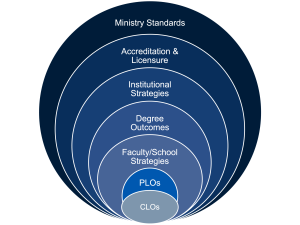Program Design
Program design of new programs or redesign of the curriculum for an existing program requires a substantial investment of time. We are available to assist and support your department and individual faculty members throughout the process. For establishing new programs at UBCO, please begin by reviewing the steps in the proposal process. The Office of the Provost and Vice-President Academic can also provide support with industry and market analyses.
We also working closely with the Provost’s Office to support Program Redesign initiatives.
Potential Goals of Curriculum Renewal/Program Re-design
Prepare for accreditation or external review: The self-study that an academic unit undergoes in preparation for an external review has elements of program review, including program learning outcomes and curriculum mapping.
Innovate around a new theme or trend: This could mean that your faculty are noticing a shift in needs of graduates based on changes in industry/society, feedback from alumni and partners, or aspire to meet a strategic challenge like integrating more experiential learning opportunities into your curriculum.
Enhance curriculum offerings: Examples of this include your faculty wanting to rethink the delivery/pedagogy for first-year courses or to add a series of courses that would strengthen and possibly set the program apart from others.
Measure program quality: This goal is inherent in all program redesign, but it could become a main focus in response to feedback received through an external review or accreditation process or related to plans to request funding through a curricular innovation grant.
Role of Program Learning Outcomes
Whether focused on program design or review, an important step in the process is developing/reviewing program-level learning outcomes. UBC’s Strategic Plan #12 (Program Design) underscores how reframing academic program design in terms of learning outcomes and competencies contributes to “a better understanding of student learning and how it can be supported most effectively.”
“Program learning outcomes are direct statements that describe the essential and enduring disciplinary skills and abilities that student should possess upon graduating from an institution” (Kenny & Desmarais, 2012). Program learning outcomes are informed by course learning outcomes where learning and most of assessment occurs. At the same time, program learning outcomes serve as pillars around which to organize course-level outcomes that take into consideration degree outcomes, institutional strategies, Ministry standards and when applicable, professional accreditation and licensure requirements. Ministry Standards for degrees (see pp. 14 – 20) provide the most general guidance and minimum standards.
Program-level learning outcomes are most meaningful when they reflect not only the essential learnings and core values of a program, but also the aspirations of its faculty, students, staff as informed by community, industry partners, and alumni.

Course Learning Outcomes at the Core of Learning Outcomes Assessment
Once the program learning outcomes have been finalized, they can be used to map the curriculum by connecting courses associated with that program to help visualize when (program level) and where (specific courses) each intended learning outcome is being focused on.
Below are some resources for drafting and assessing program learning outcomes:
- PLO Examples
- PreWork for PLO Workshop
- Slides from Developing PLOs Workshop
- Rubric for Assessing Program Learning Outcomes
- Assessment of Learning: A Program-Level View Slides
- Assessment Techniques by Learning Construct
Contact barbara.komlos@ubc.ca, Educational Consultant for Curriculum & Faculty Development for support with program learning outcome development and assessment.